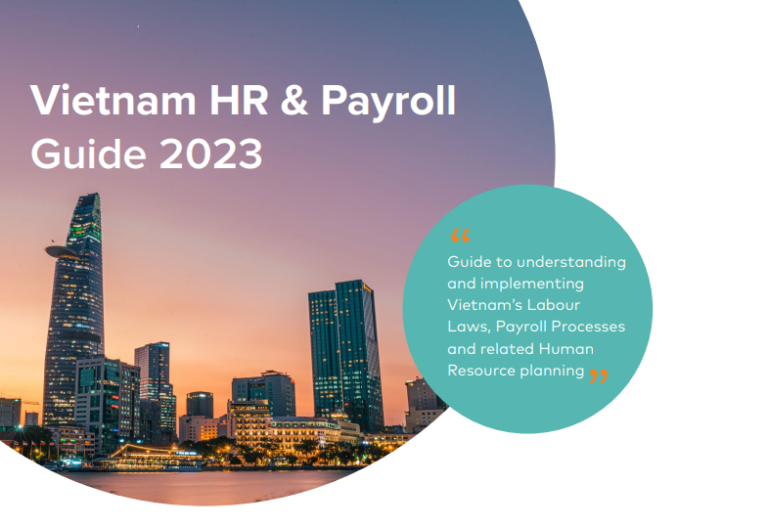Guide to hiring employees in Vietnam
Guide to hiring employees in Vietnam
Quick facts about Vietnam
- Vietnam has a population of 99 million (2021) which makes it the 15th most populous country in the world;
- Vietnam’s GDP in 2020 was 270 billion USD. This is similar to countries like Finland, Colombia and Pakistan;
- Vietnam’s GDP consist of Agriculture: 15.3% Industry: 33.3% Services: 51.3% (2017);
- Vietnam’s nominal GDP per capita is about 3,759 USD (2021), similar to countries like India, Myanmar or Uzbekistan;
- Currency: Vietnamese Dong (VND).

In the following pages, we will cover the key aspects of hiring and managing employees in Vietnam.
Employment contracts
There are four main types of employment contracts in Vietnam.
- Probation contract. Probationary contract is valid for a maximum of two months. This is understood as the “trial” period for both the company and the employee. The probation contract is not subject to the Labor Code and the company does not have to follow the prior-notice rule and there is no need to pay for Social Security for the employees.
- Fixed term contract. A contract in which the two parties determine the term and the time of termination of the contract’s validity for 3-36 months from the effective date of the contract. A one-year contract is the most common type in Vietnam. A Company can sign a fixed term contract twice, after that it has to enter into an Infinitive contract with the employee. This contract has a 30-day prior notice rule.
- Infinitive contract. A contract in which the two parties do not determine the term and the time of termination of the contract’s validity. This contract has a 45 days prior notice rule and more strict regulations on terminating it.
- Service contract. A contract signed between the company and the individual to complete a certain job/task or project. The project is understood as a short-term, irregular job and an unstable income. This type of contract is not considered a labor contract and the individual is not the employee of the company. Social security will not be subject to this contract. The personal income tax is applied at a flat rate(10% or 20%).
Employment taxes
As a standard, the employer in Vietnam must pay for four types of state insurance for employees as below:
- Social Insurance: 17.5% of gross salary, capped at 20 times national minimum wage.
- Health Insurance: 3% of gross salary, capped at 20 times national minimum wage.
- Unemployment Insurance: 1% of gross salary, capped at 20 times regional minimum wage.
- Labour Union Fee: 2% of gross salary, capped at 20 times national minimum wage.
In total, the total percentage for the above is usually 23.5% with a cap number at $330/person/month. However, due to the Covid situation, the Government has reduced the rate to 22% until July 2022.
Sample calculation of employment taxes in Vietnam
| Salary | 18,000,000 |
| Social insurance 17.50% | 3,150,000 |
| Health insurance 3% | 540,000 |
| Unemployment insurance 1% | 180,000 |
| Labor union fee 2% | 360,000 |
| Total cost for the employer | 22,230,000 |
An employer of record service fee is 10% of the total employment cost.
Further reading on employment taxes in Vietnam:
- The Essential Guide To Payroll Management in Vietnam
- Employing Foreign Workers in Vietnam
Holidays and paid time off
Your employee is entitled to receiving statutory holidays, paid time off and sick leave based on the Employment Law and the clauses in the employment contract.
Statutory holidays in Vietnam
- New Year’s Day (1st of Jan)
- Lunar New Year (Jan-Feb)
- Hung Kings Commemoration Day
- Reunification Day
- Labor Day
- Reunification Day Holiday
- Labor Day Holiday
- National Day
Paid time off in Vietnam
By the law, your employees are entitled to a minimum of 12 days of paid time off in Vietnam per year. The amount of annual leave is prorated based on how long they have worked – i.e. if an employee has been working for half a year they are entitled to up to 6 days off.
It is common to provide additional days off to your employees, especially if there are dates when the rest of the company is also not working. For example, if you are an Australian company, you might also want to give your Vietnamese employees a day off during the statutory holidays in Australia.
Sick leave
You don’t need to provide additional sick leave to your Vietnamese employees. They get their sick leave payments from the national Social Insurance department assuming they have a valid doctor letter.
An employee can take a sick leave for a maximum of 30 days per month or 180 days in total per year.
Some companies provide extra sick leave paid by the company as an employment benefit, for example for lighter illnesses that don’t require going to the doctor.
Parental leave
Parental leave for mothers
Your pregnant employees are entitled to take five days off for antenatal appointments (one day for each appointment). If your employees are located in remote areas, they might be eligible for 2 days off per appointment.
Post-partum, the mother is entitled to a 6-month parental leave. This can be shortened to four months if the employee agrees but they are not under obligation to do so.
In case of birth that requires surgery or twins, the mother is entitled to an additional 14 days off.
Parental leave for fathers
The fathers are entitled to the following parental leave in Vietnam:
- 5 working days with a normal birth of one child;
- 7 working days when the wife gives birth to a child requiring surgery or gives birth to a child under 32 weeks old;
- 10 working days for twins. Each additional child (e.g. triplets) is entitled to an additional three working days, up to a maximum of 14 working days.
Minimum and average wages
The minimum national wage in Vietnam is 1,490,000 VND. However, in many regions, the minimum wage is significantly higher.
Regional minimum wage in Vietnam
| Region | Examples | Minimum salary (VND) |
| I | Ho Chi Minh City, Hanoi | 4,420,000 |
| II | Da Nang, Hai Phong, Hue | 3,920,000 |
| III | Non-urban areas | 3,430,000 |
| IV | Under-developed or remote areas | 3,070,000 |
Average salaries in Vietnam
Vietnam has huge regional differences when it comes to an average salary and therefore it’s only useful to look at typical salaries in the most popular hiring destinations of the country:
- Ho Chi Minh City – $600-800
- Hanoi – $500-700
- Da Nang – $400-$500
- Hai Phong – $350-$450
- Hue – $350-$450
Remote employee salaries
Vietnam is an emerging destination for technical talents. Both the supply and demand for software developers has been rapidly growing in the past few years.
Here are ballparks of what kind of cost levels to expect when hiring remote employees for commonly requested positions:
| Position | Typical salary (USD) |
| Full-stack web developer (2 years of experience) | $1000-1500 |
| Customer service agent | Junior: $350-$450 Mid-level: $450-$500 Senior: $500-$700 |
| Virtual assistant | Junior: $500-$550 Mid-level: $550-650 Senior: $650-800 |
Terminating an employee
An employee must be terminated following carefully the requirements set by the Employment Law. A failure to do so can expose the company to legal liability and therefore the termination should be handled with care and precision.
The easiest contract to terminate is the probation contract. During the probation contract, the employee can be terminated without any prior notice. However, it’s a common courtesy to give the employee a chance to improve their work before terminating the contract.
Terminating a probation contract
If you wish to terminate a fixed-term contract at the expiration of the contract, you can simply notify the employee at least 15 days in advance that their contract will not be renewed. It’s important to not miss that deadline as otherwise the employment contract gets automatically extended.
If you wish to terminate an employment contract prior to the expiration, then you must have at least one of the following reasons:
- The person cannot do the job, causing loss/damage for the company as stipulated in registered Internal Regulation recognized by the law;
- The person commits a crime;
- The person resigns;
- The company has an organization’s structure change, or force majeure cases or bankruptcy.
Regardless of the reason, you must have documented evidence and give the employee at least 30 days’ notice by issuing the termination decision.
Terminating a fixed term contract
Terminating an employee on an infinite contract is similar to a fixed-term contract, except that the notice period must be at least 45 days.
It’s vital that the company has well-written Internal Regulations in place which can be used as a legitimate reason to terminate employees that violate it.
Top universities
With a population of approximately 100 million people, you are most likely not going to have difficulties attracting plenty of candidates. However, the difficulty is in attracting the top talents.
One of the helpful measures is to prioritize candidates from the top local universities – it gives an indication that the candidate has been able to get through a competitive selection process of the popular universities. Obviously, for more senior positions the education matters less.
Top 10 universities in Vietnam
- Vietnam National University, Hanoi
- Hanoi University of Science and Technology
- University of Economics Ho Chi Minh City
- Can Tho University
- The University of Da nang
- Ho Chi Minh City University of Technology
- National Economics University
- Duy Tan University
- Ho Chi Minh City University of Agriculture and Forestry
- HUTECH University
Working hours and overtime pay
An employee’s working hours in Vietnam are divided into regular hours and overtime pay. The regular hours are stated in the employment contract and can be up to 8 hours per day and a total of 48 hours a week.
Any time your employee is expected to work outside of those hours, they are entitled to overtime pay as follows:
- 150% of salary for regular days
- 200% of salary for weekends
- 300% of salary for holidays

Hiring in Vietnam made easy
VIPC's employer of record service allows you to hire anyone in Vietnam with minimum bureaucracy. Your employees will be formally on our payroll while working entirely for your company.
No need to set up a local company in Vietnam. You manage your employee, we take care of taxes, local HR matters, etc.
